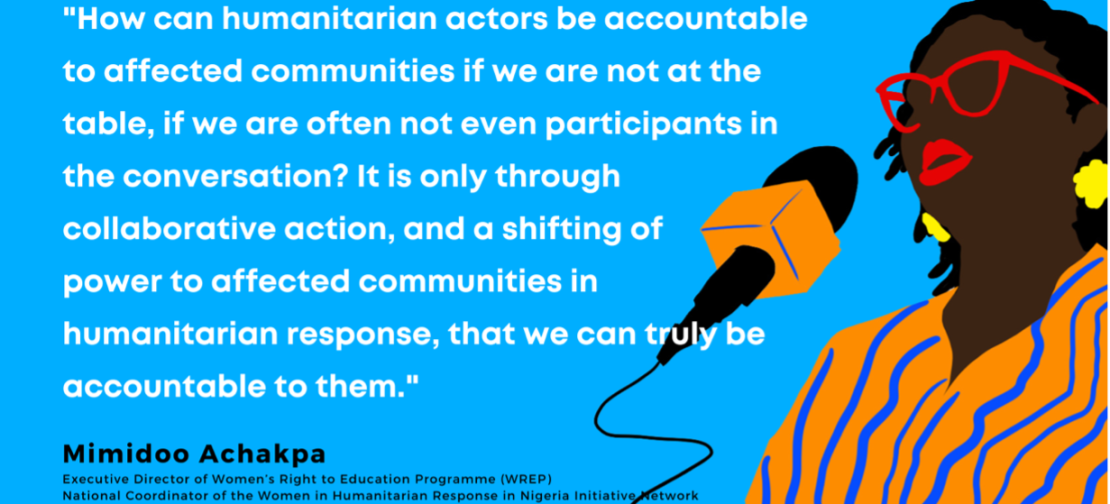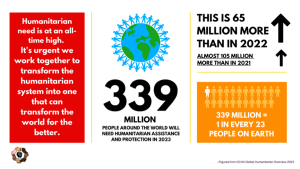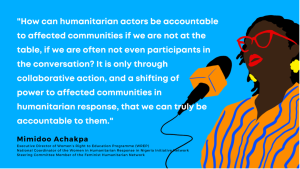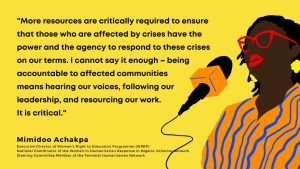
On 1 December 2022, the FHN was very proud to be represented by Steering Committee member, Mimidoo Achakpa, at OCHA’s launch of the Global Humanitarian Overview (GHO) 2023 – a comprehensive and evidence-based assessment of global humanitarian needs.
The FHN works continuously to ensure women and gender-diverse leaders, particularly from the Global South, are heard on international platforms and that their input shapes humanitarian planning and response.
Mimidoo raised bold and important points, challenging the international community to do more to ensure that accountability to communities affected by crises is truly upheld.
Having women and feminist leaders heard in these spaces is critical – but now we need to see action.
The numbers in this year’s GHO are bleak. Urgent and radical action must be taken to ensure that the response from the international humanitarian community not only delivers life saving aid, but that it addresses the root causes of crises, tackles rather than exacerbates inequality and empowers local communities — particularly women, girls and gender-diverse people to continue their own critical humanitarian work. We need a system that is transformative – a feminist humanitarian system can achieve these aims.
GHO 2023 key takeaways

The launch was held in Geneva and began with an online introduction from Secretary-General of the United Nations, António Guterres. Martin Griffiths, Under-Secretary-General and Emergency Relief Coordinator, then gave a presentation on the findings of this year’s GHO and introduced the panelists:
During the panel discussion Mimidoo was asked what accountability to people (AAP) affected by crises means to network members.

Mimidoo Achakpa full statement:
“For us, as a global feminist humanitarian network, defining AAP starts by always bearing in mind that behind the P of “people”, there are individual women, girls, men, boys, people of different ages, background, different gender identities and characteristics. So the first expectation of AAP systems is that they have to be gender, age, disability and diversity responsive to be effective.
Accountability to affected people means recognising and supporting these different people’s own response efforts, and their critical frontline humanitarian action and leadership. Yet, crisis affected people’s efforts, especially when led by women, continue to be ignored by the wider humanitarian system, whether they belong to the Women in Humanitarian Response in Nigeria Initiative Network which I coordinate or the Feminist Humanitarian Network across the Global South – our members share the same challenges.
Procedures to access funding are heavy and bureaucratic. Projects are short term and funding does not cover our costs making it impossible to retain staff and develop our systems to grow. We face language barriers, struggle with dependence on digital tools in remote areas with limited connectivity to name just but a few.
We, as women-led organizations, work tirelessly to respond to, prepare for and recover from crises. We respond to Gender-Based Violence when this issue falls off the agenda, as it so often does, especially in a crisis – just the moment when it inevitably increases. We ensure women and girls have access to health services, to shelters and to helplines.
We are amongst the first to act, and we ensure nobody is left behind. We implement our responses based on long relationships built on trust between community members. We are those community members, and we know what we need. And yet our voices are not sought out or listened to, and we have to scramble for every small amount of money that we can allocate to our work. Many women-led and women’s rights organizations representing affected people fund work from their own pockets to ensure that their communities have the specific support they need in an emergency.
Humanitarian action must be transformational and leave no one behind – it must prioritize achieving gender justice. By recognising and resourcing women’s rights and feminist organisations on the frontlines of crisis, and following our leadership – being accountable to us – significant challenges currently facing AAP strategies and mechanisms will be overcome.
AAP also means Preventing and responding to Sexual Harassment, Exploitation and Abuse. As members of affected communities, we are best placed to contribute to the design of PSHEA prevention and response strategies and deliver to women and girls friendly and accessible Complaints, Feedback and Reporting mechanisms. Currently, these systems remain inaccessible and underutilized while SHEA risks increase due to growing unmet needs.
This is just a drop in the ocean in terms of what our members are doing, and through the Feminist Humanitarian Network’s members, we know that women-led organizations all over the world are playing the same role.

More resources are critically required to scale up such innovations, and ensure that those who are affected by crises have the power and the agency to respond to these crises on our terms. I cannot say it enough – being accountable to affected communities means hearing our voices, following our leadership, and resourcing our work. It is critical. Right now, to achieve food security in the face of the crisis here in Nigeria, we are calling on humanitarian actors that hold power in the system to mainstream community and human-centered approaches, leverage local expertise, including existing Nigerian humanitarian and development networks, and ensure indigenous knowledge systems are integral to building community and systemic resilience.
This can’t be done if we, organizations representing affected communities, are not sitting alongside those at the head of the decision-making table. How can humanitarian actors be accountable to affected communities if we are not at the table, if we are often not even participants in the conversation? It is only through collaborative action, and a shifting of power to affected communities in humanitarian response, that we can truly be accountable to them. We want to see commitments to funding local actors upheld, including a significant increase in direct, flexible funding to women-led organizations, and we want a seat at the table.”
You can watch the full GHO launch online here.